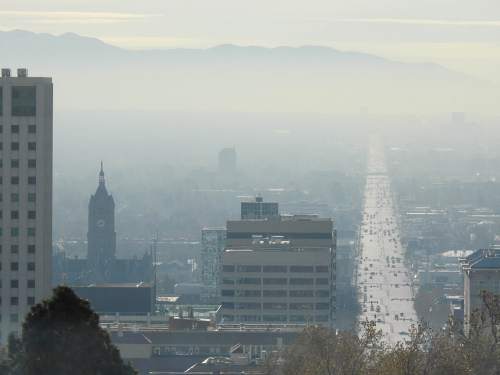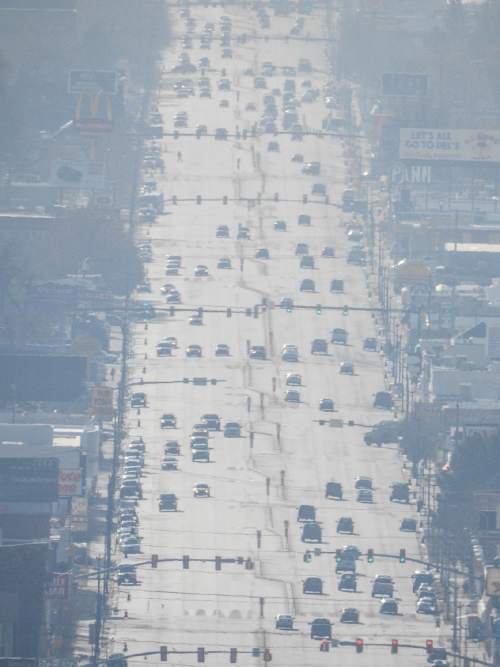This is an archived article that was published on sltrib.com in 2015, and information in the article may be outdated. It is provided only for personal research purposes and may not be reprinted.
The Environmental Protection Agency says it's clear that Utah won't be any closer to cleaning small-particulate pollution from its air by the end of the month, so it's proposing to give the state extra time to pull together a plan to do so — in exchange for reclassifying the state's failure to meet federal air-quality standards as "serious."
Salt Lake City and other areas where levels of PM2.5 exceed federal health standards are currently considered "nonattainment" areas, and designation as a "serious nonattainment" area would require the state's Division of Air Quality to develop a new, more stringent State Implementation Plan for addressing the pollution and to become more strict about how refineries and other industry are granted operating permits.
Utah would be the first state to be officially designated "serious" for PM2.5. Nonattainment areas are subject to such reclassification under the federal Clean Air Act, which also sets the time limit for meeting federal regulations — six years, in the case of particulate pollution.
Utah's clock started in December 2009 when it was designated as being in nonattainment for PM2.5 levels. As the Dec. 31 deadline approaches, the EPA could choose to pursue "discretionary" reclassification, which would allow it to immediately declare Utah as "serious" and set custom deadlines for Utah's new implementation plan; or it could simply wait for the six-year mark to pass, at which point Utah would by default become a serious nonattainment area and the usual 18-month deadline would be set.
Last month, the EPA proposed taking the former route of action. According to the agency's proposal, recorded in the Federal Register, air-monitoring data suggest it would be essentially impossible for Salt Lake City, Provo and Logan to attain the PM2.5 standard by the end of the year. So the EPA would give Utah three years — an extra 18 months — to craft a new plan for resolving small particulate pollution in these areas.
Wednesday is the final day of the public-comment period on the EPA's proposal, which also indicates that the Logan nonattainment area may be eligible for a one-year extension of the original six-year deadline. The EPA plans to consider that extension separately.
Local environmental groups are displeased about the EPA's proposal. Representatives of Western Resource Advocates, Utah Physicians for a Healthy Environment, and the Utah Chapter of the Sierra Club, signed a joint letter calling on the EPA to reject the proposed rule.
Giving Utah three years, rather than 18 months, to draft a new implementation plan would only prolong Utahns' exposure to air pollution, the groups said, and could cause the state to miss the December 2019 final deadline for compliance and further violate the Clean Air Act.
That proposed delay "frustrates attainment and the goal of safe air," the letter states, and would leave just one year between the plan's completion and the Clean Air Act deadline — a time frame that is "completely inadequate for a state to develop and implement critical regulatory steps … necessary to ensure expeditious attainment no later than 2019."
EPA spokesman Rich Mylott said he could not discuss the proposal because it's currently in a public comment period.
Closer to home, DAQ director Bryce Bird said he's still undecided about whether the proposal would help or hinder Utah's efforts to clean up its air. "I'm still weighing those options and trying to determine what would be best for Utah," he said.
On one hand, Bird said, the proposal could be advantageous because it would give DAQ more time to tie up loose ends related to past State Implementation Plans. For example, he said, the Air Quality Board recently passed a slate of amendments to the state's plan for maintaining PM10 — large particulate pollution, for which Utah was considered a nonattainment area from the late 1980s to the early 2000s. The intent, Bird said, was to "put [PM10] to bed" once and for all to allow the DAQ to shift its full attention to PM2.5.
The division is also racing to complete several studies on unique factors that contribute to PM2.5 pollution in Utah, Bird said, and having the time to complete these studies could result in a more effective implementation plan.
On the other hand, Bird said, delaying the declaration could spare Utah the dubious honor of being the first state in the nation to be in serious nonattainment because of its fine-particulate pollution.
Twitter: @EmaPen





